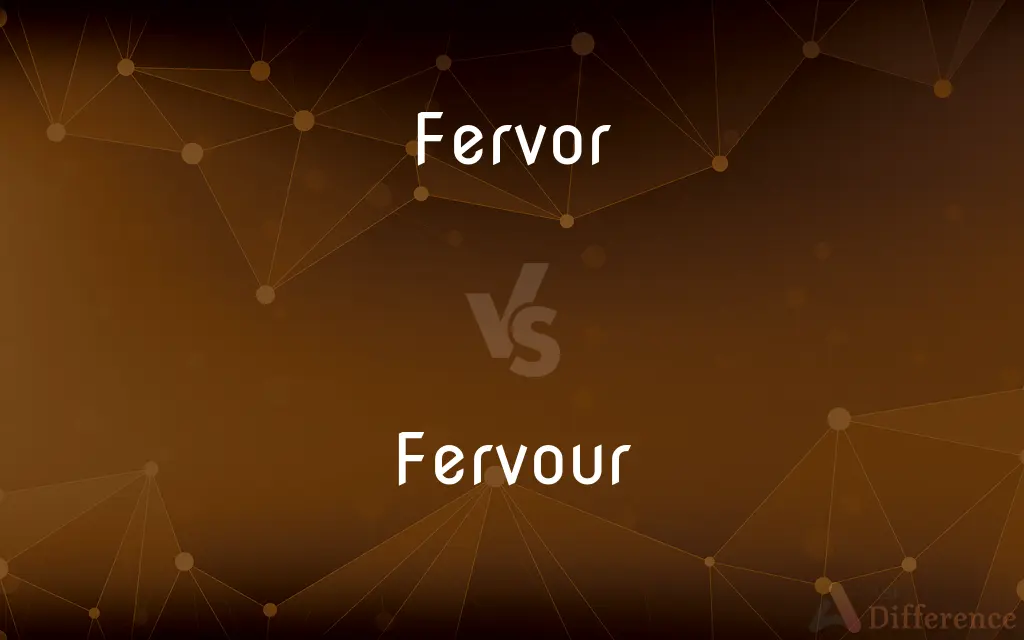Fervor vs. Fervour — What's the Difference?
By Urooj Arif & Maham Liaqat — Updated on April 21, 2024
Fervor (American spelling) and fervour (British spelling) refer to intense passion or enthusiasm, differing primarily in regional spelling preferences.

Difference Between Fervor and Fervour
Table of Contents
ADVERTISEMENT
Key Differences
Fervor is the American English spelling of a noun that describes intense and passionate enthusiasm. Whereas, fervour is the British English variant, maintaining the same meaning and usage in sentences.
In American publications, "fervor" is commonly used in various contexts, such as political, religious, or general excitement. On the other hand, "fervour" is preferred in these same contexts within the UK, Canada, Australia, and other countries using British English.
When referring to historical texts or quotes, American writers might still encounter the use of "fervour" if the source is originally British. Conversely, British authors may use "fervor" when directly quoting American sources.
The pronunciation of "fervor" and "fervour" remains virtually identical, despite the spelling differences. However, the presence of the 'u' in "fervour" does not affect its pronunciation.
Style guides and dictionaries in the U.S. recommend using "fervor", ensuring consistency in American English writing. Meanwhile, British style guides uphold "fervour" as the standard form, reflecting broader spelling conventions like "colour" and "honour".
ADVERTISEMENT
Comparison Chart
Spelling
Without 'u'
With 'u'
Usage Region
United States
United Kingdom, Canada
Pronunciation
/ˈfɜrvər/
/ˈfɜrvər/
Example in a Quote
"His fervor was visible in his actions."
"His fervour was visible in his actions."
Style Guide
American style guides
British style guides
Compare with Definitions
Fervor
A state of fiery or heated emotion.
The debate sparked a fervor among the audience.
Fervour
Intense and passionate feeling.
Her fervour for environmental issues is well-known.
Fervor
Great warmth and earnestness of feeling.
She spoke with fervor about her research.
Fervour
A state of fiery or heated emotion.
The crowd cheered with fervour.
Fervor
Zealous or fervid enthusiasm.
The fervor with which he supports the team is unmatched.
Fervour
Great warmth and earnestness of feeling.
He expressed his ideas with great fervour.
Fervor
Vigorous determination.
He pursued his goals with fervor.
Fervour
Vigorous determination.
She undertook the project with unmatched fervour.
Fervor
Intense and passionate feeling.
His fervor for social justice inspired many.
Fervour
Zealous or fervid enthusiasm.
Her fervour for the arts was contagious.
Fervor
Great warmth and intensity of emotion.
Fervour
Intense and passionate feeling
He talked with all the fervour of a new convert
Fervor
Intense heat.
Fervour
Intense heat.
Fervor
(American spelling) An intense, heated emotion; passion, ardor.
The coach trains his water polo team with fervor.
Fervour
Variant of fervor.
Fervor
(American spelling) A passionate enthusiasm for some cause.
Fervour
An intense, heated emotion; passion, ardour.
Fervor
(American spelling) Heat.
Fervour
A passionate enthusiasm for some cause.
Fervor
Heat; excessive warmth.
The fevor of ensuing day.
Fervour
Heat.
Fervor
Intensity of feeling or expression; glowing ardor; passion; holy zeal; earnestness.
Winged with fervor of her love.
Fervour
The state of being emotionally aroused and worked up;
His face was flushed with excitement and his hands trembled
He tried to calm those who were in a state of extreme inflammation
Fervor
Feelings of great warmth and intensity;
He spoke with great ardor
Fervour
Feelings of great warmth and intensity;
He spoke with great ardor
Fervor
The state of being emotionally aroused and worked up;
His face was flushed with excitement and his hands trembled
He tried to calm those who were in a state of extreme inflammation
Common Curiosities
Why does British English add a 'u' in fervour?
British English often retains older French spellings where 'u' follows 'o', seen in words like "colour" and "honour".
In digital communication, which version is more commonly used, fervor or fervour?
In digital communications, the usage often depends on the default language settings of the software being used, with "fervor" being more common on American platforms and "fervour" on British or Commonwealth platforms.
Do dictionaries list fervor and fervour as variants of the same word?
Yes, dictionaries such as the Oxford English Dictionary and Merriam-Webster recognize "fervor" and "fervour" as American and British spelling variants of the same word.
What is the main difference between fervor and fervour?
The main difference is spelling; "fervor" is American English, while "fervour" is British English.
Can fervor and fervour be used interchangeably in writing?
Yes, but consistency with either American or British English should be maintained based on the audience.
How should I choose between fervor and fervour when writing for an international audience?
When writing for an international audience, choose the version of English (American or British) that best fits the majority of your readers, or follow the specific style guide required by the publication or organization.
What types of writing most frequently use the terms fervor and fervour?
"Fervor" is commonly found in American literature, speeches, and academic writing, whereas "fervour" is used in similar contexts within British English territories.
Is the pronunciation of fervor different from fervour?
No, both are pronounced the same way.
Are there any contexts where fervor and fervour have different meanings?
No, they have the same meanings and are used similarly, differing only in spelling.
Is there any historical reason why American English dropped the 'u' in words like fervour?
American English often dropped the 'u' in words like "fervour" as part of a broader simplification and differentiation effort led by figures like Noah Webster, who aimed to create a distinct American form of English in the 18th and 19th centuries.
Share Your Discovery

Previous Comparison
Capacitor vs. Resistor
Next Comparison
Perceivably vs. PerceivableAuthor Spotlight
Written by
Urooj ArifUrooj is a skilled content writer at Ask Difference, known for her exceptional ability to simplify complex topics into engaging and informative content. With a passion for research and a flair for clear, concise writing, she consistently delivers articles that resonate with our diverse audience.
Co-written by
Maham Liaqat













































